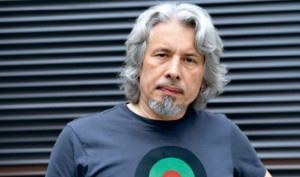 Vladimir Sorokin was born on August 7, 1955 in the small town of Bykovo, near Moscow. He made his literary debut in 1972 in the large industrial newspaper Za kadry neftyanikov. In 1977, he graduated from the Moscow Instutute of Oil and Gas with a degree in engineering, but quickly abandoned this field to pursue his interests in in graphic arts, painting, and conceptual art. Throughout the 1970s, Sorokin participated in a number of art exhibitions and designed and illustrated nearly 50 books.
Vladimir Sorokin was born on August 7, 1955 in the small town of Bykovo, near Moscow. He made his literary debut in 1972 in the large industrial newspaper Za kadry neftyanikov. In 1977, he graduated from the Moscow Instutute of Oil and Gas with a degree in engineering, but quickly abandoned this field to pursue his interests in in graphic arts, painting, and conceptual art. Throughout the 1970s, Sorokin participated in a number of art exhibitions and designed and illustrated nearly 50 books.
Sorokin’s development as a writer took place amidst painters and writers of the Moscow underground scene of the 1980s. In 1985, six of Sorokin’s stories appeared in the Paris magazine A-Ya. In the same year, French publisher Syntaxe published his novel ”Очередь“ (The Queue).
Sorokin’s works, bright and striking examples of underground culture, were banned during the Soviet period. His first publication in the USSR appeared in November 1989, when the Riga-based Latvian magazine “Родник” (Spring) presented a group of Sorokin’s stories. Soon after, his stories appeared in Russian literary miscellanies and magazines “Третья модернизация”
(The Third Modernization), Митин, “Конец века” (End of the Century), and “Вестник новой литературы” (Bulletin of the New Literature). In 1992, Russian publishing house Russlit published Сборник рассказов (Collected Stories) – Sorokin’s first book to be nominated for a Russian Booker Award. In September 2001, Vladimir Sorokin received the National Booker Award; two months later, he was presented with the Award of Andrey Beliy for outstanding contributions to Russian literature.
Sorokin’s books have been translated into English, French, German, Dutch, Finnish, Swedish, Italian, Polish, Japanese, and Korean and are available through a number of prominent publishing houses, including Gallimard, Fischer, DuMont, BV Berlin, Haffman, and Verlag der Autoren.
He is also a member of Russian Pen club.
Sorokin lives in Moscow with his wife and twin daughters.
Sorokin’s Works:
Novels
День опричника, Moscow: Zakharov, 2006
23000, Moscow: Zakharov, 2005
Путь Бро (Bro’s way) Moscow: Zakharov, 2004.
Лед (Ice) Moscow: Ad Marginem, 2002.
Пир (The Feast) Moscow: Ad Marginem, 2000.
Голубое Сало (Blue Fat, or Blue Lard) Moscow: Ad Marginem, 1999.
Первый Субботник (The First Saturday Workday) In Collected Works in Two Volumes. Moscow: Ad Marginem, 1998.
Сердца Четырех (Four Stout Hearts) Moscow: Literary Miscellany ”Конец Века”, 1994.
Тридцатая любовь Марины (Marina’s Thirtienth Love) Moscow, R. Elinina, 1995.
Роман (A Novel), Moscow, „Три Кита“ in cooperation with Obscuri Viri, 1994.
Норма (The Norm), Moscow, „Три Кита“ in cooperation with Obscuri Viri, 1994.
Очередь (The Queue), Paris: Syntaxe, 1985.
Plays, published in various magazines
Доверие (Confidence) [1989].
Hochzeitreise (The Post-Nuptial Journey) [1994-1995].
Дисморфомания (Dismorphomania) [1990].
Пельмени [1984-1987].
Достоевску-Трип [1997].
Русская бабушка (Russian Grandmother) [1988].
Щи (Cabbage Soup) [1995-1996].
С Новым Годом (Happy New Year) [1998].
Юбилей (Anniversary) [1993].
Землянка (The Hut, or Earth-house) [1985].
Film Scripts
Безумный Фриц (Mad Fritz), 1994. Directors: Tatiana Didenko and Alexander Shamaysky.
Москва (Moscow), 2001. Director: Alexander Zeldovich. First Prize on the festival in Bonn; Award of Federation of Russian Film-Clubs for best Russian movie of the year.
Копейка (Kopeck), 2002. Director: Ivan Dykhovichny. Nomination for Award “Zolotoy Oven” for best film script.
4 (Four), 2004. Director: Ilya Khrzhanovsky. Grand Jury Prize of International Film Festival Rotterdam.
Вещь (Thing). Director: Ivan Dykhovichny.
Cashfire. Director: Alexander Zeldovich.
Photograph album В глубь России (In the Depths of Russia), in cooperation with painter Oleg Kulik.
Libretto for opera Дети Розенталя (Rosenthal’s Children), with music by Mikhail Desyatnikov; written on request of the Bolshoi Theater, Moscow.
…dozens of stories published in Russian and foreign periodicals.
Note: for a comprehensive list of Sorokin’s publications, please see
http://www.srkn.ru/bibliography/
About Sorokin
Sorokin is a writer who is not only demolishing literary and cultural taboos in his works, but also challenging the notion of literature itself, and the role of the reader in the literary process. In all his major works he seems to be asking the reader: dare you read on?
For Sorokin, the act of writing is an author’s attempt to come to terms with his own psyche, or to shield it from reality. Therefore there is a strong aftertaste of psychoanalysis left when reading his works.
A key feature of Sorokin’s texts is the disintegration of syntax into nonsensical letter and word combinations: it is as if the text has had a nervous breakdown. Sorokin’s text becomes a mirror of the social and political reality it is meant to represent. His writing does not preach or teach, in the classical Russian tradition, but instead urges the reader to be an active participant in the construction of meaning or “significance”.
Sorokin deliberately shocks his reader, and he also plays around with literary conventions, whether they be of the classical variety, as in A Novel, or the pulp fiction that became so popular in Russia in the early 1990s.
Sorokin’s written work attacks the symbols of totalitarianism, turning both reality and the text into a grotesque and nightmarish phantasmagoria.
David Gillespie and Elena Smirnova, University of Bath
About „Norma”
Sorokin’s narrative strategy is emphatically postmodern, but at the same time Norma can be deeply linked to the realistic tradition of the Russian novel. The goal of Gogol’s Dead Souls was the same: to reflect critically and ironically Russia’s historical reality, to transmit it “just as it was.” Norma is (post)modern in its form, and (post)realistic in its content.
Juri Talvet, University of Tartu, Estonia